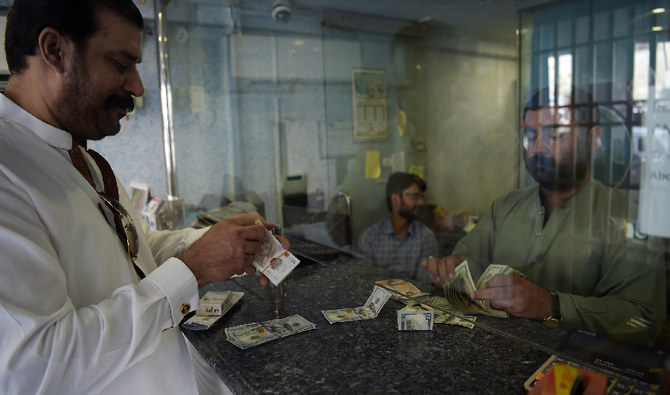KARACHI: Commercial banks in Pakistan have witnessed a decline of 13.49 percent in their foreign exchange reserves on the back of subdued demand for the US dollar, as rupee-based investments become more attractive to investors, banking experts said on Sunday.
Financial analysts say banks’ forex reserves have declined mainly due to rupee dominated treasury bills (T-bills), where the return on investment is a whopping 13.5 percent.
At the same time, the country’s foreign currency reserves have been consistently on the rise for the past seven months. This has stabilized the Pakistani rupee with a drop in the US dollar of 6 percent since the end of the last fiscal year. This makes the rate of return on rupee-based investments much more attractive than smaller returns on foreign currency deposits in banks.
“The inflow of the hot money vis-a-vis investment in T-Bills has stabilized the Pak rupee and now people think that the investment in the dollar is not attractive as compared to investment in rupee-based deposits with above 13 percent returns,” Muzamil Aslam, a senior financial expert, told Arab News.
“People are selling dollars they were holding for better returns which is stabilizing the national currency,” he said.
The foreign exchange reserves held by commercial banks fell to a 14 month low at $6.4 billion on Jan. 31, 2020 compared to $7.36 billion on Aug. 17, 2019, State Bank of Pakistan (SBP) data shows.
The current level of forex reserves stand at $12.27 billion as of Jan. 31, 2020, according to SBP.
Additionally, experts say overseas investors are pouring in “hot money” into Pakistan, to take advantage of the huge rate of return on T-bills.
“Based on the current economic scenario, we are estimating an inflow of around $5 billion worth of ‘hot money’ into the country during the current fiscal year,” Ashfaq Tola, a Karachi-based tax consultant, told Arab News.
Net Foreign Portfolio Investment in T-Bills has increased by $209 million since July 2019 to reach $2.9 billion, and in Pakistan Investment Bonds (PIB) to $36 million by the end of January 2020, according to research shared by brokerage Topline Securities.
However, some bankers link the decline of the commercial banks' forex reserves with the withdrawal of dollars from bank accounts amid speculations of tax authorities’ access to those accounts.
“It was noticed that some businessmen had withdrawn dollar accounts and rupees as well, because of the fear of FBR (Federal Board of Revenue)”, Ahmed Ali Siddiqui, a banker and deputy convenor of the standing committee on Islamic Banking of Federation at Pakistan Chambers of commerce and Industry, said.
“The return on the dollar account is not attractive and encouraging as compared to the rupee based accounts. People may prefer to keep the dollar in hand or in lockers,” he added.
















